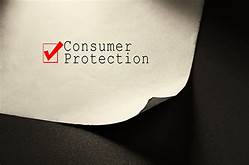 Most of our debt collection laws in Florida apply only for consumer debt, not business debt. Sometimes the answer is not quite clear as to what type of debt is involved. What if for instance you operate a business and took out a loan, but signed a personal guarantee. Sometimes, that personal guarantee will have language referring to the debt being for personal, family or household use. That would likely make the guarantee a consumer debt.
Most of our debt collection laws in Florida apply only for consumer debt, not business debt. Sometimes the answer is not quite clear as to what type of debt is involved. What if for instance you operate a business and took out a loan, but signed a personal guarantee. Sometimes, that personal guarantee will have language referring to the debt being for personal, family or household use. That would likely make the guarantee a consumer debt.
By the way, that terminology comes from the Florida Consumer Collection Practices Act (“FCCPA”), Fla. Stat. Section 559.55-559.77 which defines a consumer debt as a debt incurred for “personal, family or household use.”
What happens if you buy a house, live in it for years, but then ultimately end up moving and renting it out? Or you rent out a room while you are living there? Commericial or consumer debt?
 Reboot Your Life: Tampa Student Loan and Bankruptcy Attorney Blog
Reboot Your Life: Tampa Student Loan and Bankruptcy Attorney Blog




 In the past year, Floridians have been hit with ten thousand or more deficiency lawsuits by Dyck-O’Neal, a collector hired by Fannie and Freddie to go after unfortunate homeowners. Many defaults have been obtained against homeowners which should not have occurred due to lack of personal and/or subject matter jurisdiction. Many folks did not even know these additional lawsuits have been filed against them. A recent New York Times
In the past year, Floridians have been hit with ten thousand or more deficiency lawsuits by Dyck-O’Neal, a collector hired by Fannie and Freddie to go after unfortunate homeowners. Many defaults have been obtained against homeowners which should not have occurred due to lack of personal and/or subject matter jurisdiction. Many folks did not even know these additional lawsuits have been filed against them. A recent New York Times  Mortgage companies in Florida must think money really does grow on trees as they are now suing for deficiency judgments on past foreclosures of homes. July 1, 2014 was the deadline in Florida for lenders to file deficiency lawsuits for foreclosure Judgments issued between July 1, 2009 and July 1, 2013. This is the result of the foreclosure bill last summer drastically dropping the number of years for a mortgage company to sue for a deficiency from five years to only one year.
Mortgage companies in Florida must think money really does grow on trees as they are now suing for deficiency judgments on past foreclosures of homes. July 1, 2014 was the deadline in Florida for lenders to file deficiency lawsuits for foreclosure Judgments issued between July 1, 2009 and July 1, 2013. This is the result of the foreclosure bill last summer drastically dropping the number of years for a mortgage company to sue for a deficiency from five years to only one year. Under Florida law, a creditor has up to twenty years to try and collect a judgment. That’s an intimidating number, two whole decades. Something not to take lightly. To become a lien on real estate, a certified copy of a final judgment must be recorded in the public records in the county in which the real property is located.
Under Florida law, a creditor has up to twenty years to try and collect a judgment. That’s an intimidating number, two whole decades. Something not to take lightly. To become a lien on real estate, a certified copy of a final judgment must be recorded in the public records in the county in which the real property is located. In Florida, typically someone who is sued is served with the lawsuit and given 20 or sometimes 30 days to file a response. If the lawsuit was filed in small claims court, you are given a date to appear at a pretrial conference instead of filing a written response.
In Florida, typically someone who is sued is served with the lawsuit and given 20 or sometimes 30 days to file a response. If the lawsuit was filed in small claims court, you are given a date to appear at a pretrial conference instead of filing a written response. Here’s an example in Tampa, Florida this month for one of our foreclosure clients who wanted to keep her house and avoid the possibility of a deficiency judgment:
Here’s an example in Tampa, Florida this month for one of our foreclosure clients who wanted to keep her house and avoid the possibility of a deficiency judgment:
 When listing and selling a home in a short sale, homeowners should consider including language to limit recovery of any unpaid amounts by the mortgage company (known as the deficiency balance). In Florida, we recommend this limitation be placed in the Purchase and Sale Contract. This way when the lender/bank agrees to the short sale, they are in essence agreeing to the terms of the contract between the buyer and seller. It is no different than if you wrote in “as-is” to limit your liability as to the condition of the property. I’d recommend something like the following be inserted into the contract:
When listing and selling a home in a short sale, homeowners should consider including language to limit recovery of any unpaid amounts by the mortgage company (known as the deficiency balance). In Florida, we recommend this limitation be placed in the Purchase and Sale Contract. This way when the lender/bank agrees to the short sale, they are in essence agreeing to the terms of the contract between the buyer and seller. It is no different than if you wrote in “as-is” to limit your liability as to the condition of the property. I’d recommend something like the following be inserted into the contract: